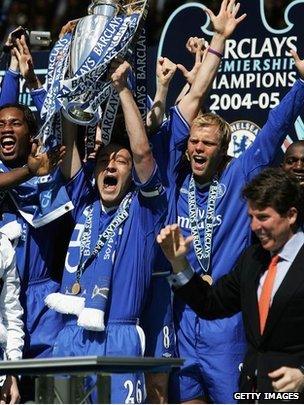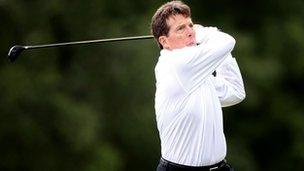Profile: Barclays' chief executive Bob Diamond
- Published

US-born Bob Diamond is a Chelsea fan and also follows the New England Patriots
Barclays' highly paid and controversial chief executive, Bob Diamond, has resigned.
Before he was chief executive he headed up the bank's investment banking arm, Barclays Capital, which has been associated by investigators with the offences that led to Barclays' £290m fine.
There were widespread calls for his resignation because the offences took place within his department and on his watch, especially after the bank's chairman, Marcus Agius, announced his own resignation.
Mr Diamond had already said that he would not take a bonus for this year as a result of the scandal.
It was not the first time the 60-year-old Boston-born former academic - he began his career as a university lecturer - had made the headlines.
Mr Diamond was previously best-known for his huge wealth: last year he topped the list of the highest-paid chief executives in the FTSE 100.
'Unacceptable face'
In 2011 Mr Diamond earned £20.9m, comprising salary, bonuses and share options, and he is reported to have a personal wealth of £105m.
There has long been controversy about the amount he earns.
In 2010, Lord Mandelson described him as the "unacceptable face of banking", saying he had taken a £63m salary for "deal-making and shuffling paper around".
Barclays dismissed the figure as "total fiction" saying that his salary as head of Barclays Capital was actually £250,000.

He is also a keen golfer and plays off a 9.2 handicap
BBC business editor Robert Peston said he believed Mr Diamond had earned £6m in 2009 from a long-term incentive scheme and £27m from selling his stake in a Barclays-owned business that had been sold.
He joined Barclays in 1996, having worked in senior positions at Credit Suisse First Boston and Morgan Stanley International.
As the world financial system teetered on the brink in 2008 and 2009, Mr Diamond won accolades for his role in the successful and profitable takeover of the US operations of Lehman Brothers.
The deal - described by Mr Diamond himself as "transformational" - catapulted Barclays into the top league of global investment banks.
He took over as chief executive of Barclays in September 2010.
Barclays set itself apart from its competitors by refusing a British government bank bailout at the height of the credit crunch crisis, arguing that Barclays would make more money if it was not subject to any extra government controls.
'No justification'
Instead, Barclays opted to raise money by selling a large stake in itself to foreign investors (mainly from Qatar, China and Singapore), which boosted the bank's share price and Mr Diamond's bonuses.
Those bonuses themselves have become increasingly controversial: there was "no possible justification" for his 2010 award of £6.5m, according to Len McCluskey, general secretary of the Unite union.
This response may be expected from a trade union leader, but shareholders have started to show unease too. This April, nearly 27% of the votes cast at Barclays' annual general meeting rejected the bank's remuneration report.
The opposition came despite Mr Diamond's bonus payments being restructured so that he would only receive half of them unless certain challenging targets for the bank were met.
For many, Mr Diamond compounded his offences when he told MPs last year the time for "remorse and apology" by banks over their role in the financial crisis should end.
But his time at Barclays was finally ended by a scandal at Barclays Capital, for which remorse and apologies were not enough.
He may now have more time to indulge his other interests, which include sports and the arts.
Away from banking, Mr Diamond is a fan of Chelsea and also follows the New England Patriots American football team. He plays golf off a 9.2 handicap.
He also chairs the board of theatre company Old Vic Productions, whose other members include Dame Judi Dench and Billy Elliot director Stephen Daldry.